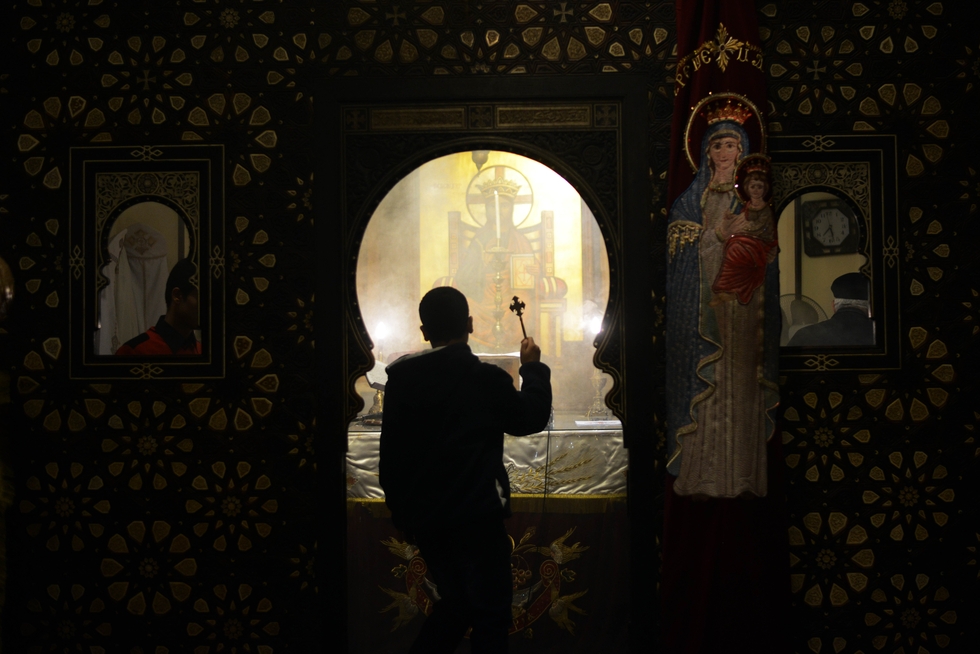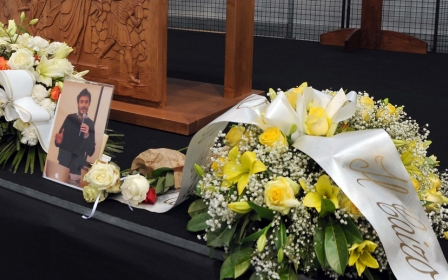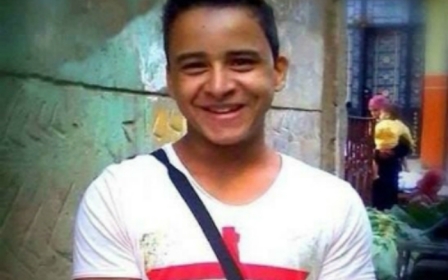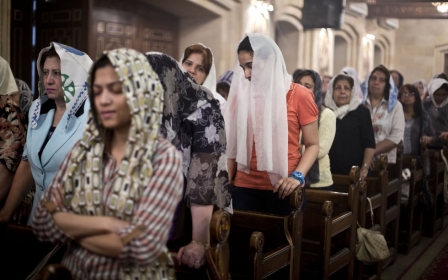Egypt author given 3-year jail term for 'insulting religion' amid legal row

CAIRO - A court in Egypt on Thursday upheld a three-year prison sentence against a writer convicted of "insulting religion" after he used Facebook to criticise the mass slaughter of sheep during the Islamic festival of Eid.
The decision comes amid a growing battle over “contempt of religion” that has been brewing in Egypt, with a small but growing band of MPs moving to amend a controversial bill that has been increasingly used to arrest and harass anyone deemed to be insulting Islam.
Fatima Naoot, who is known for her writings on women's and animal rights, was sentenced earlier this year to three years in prison, and a court on Thursday upheld the sentence, with Naoot and her legal team absent.
Mona Mounir, an Egyptian MP from the “For the Love of Egypt” list, has been leading the charge to amend the law under which Naoot was convicted, and introduced a bill to amend the law at the end of February.
"We ask for legislation that clearly defines and frames what is ‘contempt of religion’ so it won’t be misused to criminalise innocent people,” Mounir told MEE. Another 50 MPs signed her proposal.
The moves comes after a string of high-profile cases in which the law has been used to prosecute people, including minors.
In late February, four Copt students in Egypt’s Minya province were found guilty of insulting Islam after they filmed a video making fun of the Islamic State group.
A juvenile minor offences court sentenced, in absentia, Mueller Atef, 17, Bassem Amgad, 16, and Albert Ashraf, 16, to five years in prison and Clinton Magdy, under 18, to juvenile custody for five years.
Their teacher, Gad Youssef Younan, was previously sentenced at the end of December 2015 to three years in prison in a separate trial over the same charge. He is at present free on bail pending an appeal against his sentence.
According to their lawyer, Maher Naguib, the teens made a 28-second video on an iPhone during a school trip in February 2015. The video mocked IS members carrying out a beheading and was filmed by their teacher Gad Youssef Younan. In the short video, the students appeared to be pretending to pray, with one of them standing behind another, placing a hand on his throat to act out decapitation.
The clip came after horrific footage emerged showing IS fighters in Libya beheading 21 Egyptian Copts, 20 of them from Minya.
It appears that the teacher later posted the clip online, where it was seen by a Muslim student who informed the school principal, who in turn reported it to the police.
The police then moved to arrest the four youths and their teacher last April.
The court renewed the teens' pre-trial custody order several times and they were held for 60 days in jail, where they were subjected to rough living conditions, before being released on bail of 10,000 Egyptian pounds ($1,126) each.
Naguib insists the video was a spontaneous act by the students, that there was no preparation and that the teens imitated prayers to mock IS not to ridicule Islam.
“I was shocked by the sentence; those boys didn’t mean any harm,” Naguib told MEE. “They didn’t ridicule one single verse of the Quran, nor Islam, nor the Prophet Muhammad.”
The teens were so scared and shocked by the experience, Naguib said, that they went into hiding after initial rulings against them. No one knows where they are and even their families are being kept out of the loop to avoid undue government pressure.
After his release on bail, their teacher Younan was also forced after a meeting of elders to leave his village with his family and three children. He is currently not working, and his school has refused to pay his salary.
The ruling against the students has been condemned by many Egyptian members of parliament, rights organisations and a few political parties.
On 27 February, six political parties and 20 human rights organisations issued a statement saying: “This sentence confirms that the call by the president to renew Islamic speech has been limited to official speeches and media statements, and provides support for extremist and terrorist ideas and groups,”
“These children shouldn’t face prison for expressing themselves, even with an immature joke,” said Nadim Houry, HRW’s deputy Middle East director.
Mounir has called the verdict an “over-exaggeration”.
Growing trend
According to Ishaq Ibrahim, a researcher on religious freedoms at the Egyptian Initiative for Personal Rights (EIPR), there have been at least 20 "contempt of religion" cases since the start of last year that have made it to court and probably many more that have not.
This is a jump from previous years, with the organisation documenting 13 incidents in 2013, 12 in 2012 and three in 2011, the researcher said.
It is not uncommon that the "contempt of religion" charge is used to target religious minorities and those who challenge Islam's beliefs.
In February, two days before the ruling against the four Copt students, online activist Mustafa Abdel-Nabi was convicted to three years for posting religious opinions on his Faceboook page that were deemed to be "degrading to God".
Last December Islam Behery, a TV host and an Islamic researcher, was given a one-year sentence, reduced from an initial five-year term, for insulting Islam by expressing views contrary to official religious narratives.
In May 2015, Mahmoud Dahroug, a dentist from the northeastern Daqahlia governorate, was imprisoned for six months for possessing books on Shia Islam that were found after police raided his home.
Meanwhile in January, Karim al-Banna faced three years’ imprisonment after he was accused of using social media to spread anti-religious ideas.
“Anyone in Egypt who expresses a view that counters or differs from the official line may be found guilty of insulting religion,” Ibrahim told MEE.
Article 98 of the Egyptian penal code has been the main weapon against those accused of promoting contempt of religion. It prohibits any expression of “extremist ideologies with the aim of provoking sedition, disparaging or contempt of one of the divine religions or any sects belonging to it or harming national unity or social peace,” and says that this must be punishable by a minimum of six months and up to five years in prison.
The teens’s lawyer Naguib says that the spike in cases is due to outdated laws that have not kept up with fast-changing times and that courts have tended to take a radical and intolerant attitude and have issued harsh sentences.
According to a study issued by EIPR in August 2014, trials associated with religious defamation cases have noticeably increased since the 25 January 2011 revolution that toppled former president Hosni Mubarak, under his successors Mohamed Morsi (2012-2013) and the present president, Abdel Fattah al-Sisi. The report accuses the state and its executive bodies of lacking neutrality while judges have adopted conservative interpretations of legal provisions on crimes of religious defamation.
However, government officials have continually denied the allegations and insist that they do not interfere in judicial matters.
They say that freedom of speech and belief has not been unfairly impacted, instead arguing that some tougher measures are necessary for security reasons.
Given the increase in prosecutions, few of those impacted by the charges are willing to speak to the media. Some have changed their telephone numbers to avoid attention, others have moved home or fallen off the grid entirely.
But Ahmed Harqan, a well-known atheist and human rights activist, has defied the trend, often appearing on Egyptian media to voice his views, regardless of the consequences.
His ordeal began in October 2014 when he was strolling in Alexandria with his pregnant wife. The couple was attacked by a group of armed strangers who tried to kill them.
Harqan and his wife were injured but they managed to get away and flee to a nearby police station. However, once they got there, instead of police taking action against the assailants, Harqan says that the police again attacked him and his wife – both physically and verbally – before charging them with blasphemy and "defamation of religion".
“We were questioned over our faith in God; we both got beaten up and [were] held at the police station for a night,” Harqan told MEE. “Even my wife was hit in her belly; she had a miscarriage as a result of that.
“There are people who are still pressing charges against me for my views. I don’t feel secure at all.”
Unclear law
With the number of cases growing, parliamentarians say that they are being pushed to act.
Mounir says she and many others are concerned that the present law is largely being used against those who are deemed to have insulted Sunni Islam. She says that at the very least a new provision that applies to the disregard of other faiths too must be adopted and a greater level of transparency introduced.
“I ask moderate Muslim judges and religious figures to say on what basis people are being punished,” she said. “This law affects anyone who uses logic. However, religion is not against logic.”
The MP also said she was worried that growing numbers of young people, including minors, were being prosecuted under the current law.
Others argue against the law altogether.
Ibrahim noted that the “contempt of religion” charge contradicts Article 64 of the Egyptian constitution, which says that “freedom of belief is absolute”, and Article 65, which “guarantees” freedom of thought and opinion.
He also says that in many cases the judiciary acted according to their own interpretation or personal sentiments and did not follow or abused the law, something the state has been unwilling to rectify and Ibrahim says it has even encouraged this in some of its messages and statements.
“If the state sends a message of religious freedom that will reach the judge, the policeman and the average man, then everyone will comply with the law and show good conduct,” he said.
Middle East Eye propose une couverture et une analyse indépendantes et incomparables du Moyen-Orient, de l’Afrique du Nord et d’autres régions du monde. Pour en savoir plus sur la reprise de ce contenu et les frais qui s’appliquent, veuillez remplir ce formulaire [en anglais]. Pour en savoir plus sur MEE, cliquez ici [en anglais].




